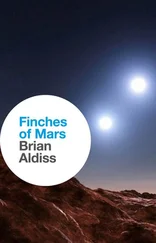Brian Aldiss - White Mars
Здесь есть возможность читать онлайн «Brian Aldiss - White Mars» весь текст электронной книги совершенно бесплатно (целиком полную версию без сокращений). В некоторых случаях можно слушать аудио, скачать через торрент в формате fb2 и присутствует краткое содержание. Год выпуска: 1999, ISBN: 1999, Издательство: Little, Brown UK, Жанр: Фантастика и фэнтези, на английском языке. Описание произведения, (предисловие) а так же отзывы посетителей доступны на портале библиотеки ЛибКат.
- Название:White Mars
- Автор:
- Издательство:Little, Brown UK
- Жанр:
- Год:1999
- ISBN:0-316-85243-0
- Рейтинг книги:5 / 5. Голосов: 1
-
Избранное:Добавить в избранное
- Отзывы:
-
Ваша оценка:
- 100
- 1
- 2
- 3
- 4
- 5
White Mars: краткое содержание, описание и аннотация
Предлагаем к чтению аннотацию, описание, краткое содержание или предисловие (зависит от того, что написал сам автор книги «White Mars»). Если вы не нашли необходимую информацию о книге — напишите в комментариях, мы постараемся отыскать её.
White Mars — читать онлайн бесплатно полную книгу (весь текст) целиком
Ниже представлен текст книги, разбитый по страницам. Система сохранения места последней прочитанной страницы, позволяет с удобством читать онлайн бесплатно книгу «White Mars», без необходимости каждый раз заново искать на чём Вы остановились. Поставьте закладку, и сможете в любой момент перейти на страницу, на которой закончили чтение.
Интервал:
Закладка:
Apart from this pleasant sound, the domes were reasonably quiet, since the small jojo (“jump-on-jump-off”) electric buses taking people about made little noise.
As I grew to know the settlement better, I found this colourful sector was just the “tourist spot”. Beyond it lay the rather grimmer Permanents Sector, austere and undecorated, lying behind P. Lowell Street.
All this was enclosed, of course, under domes and spicules. Outside lay an airless planet of rumpled rock. My spine tingled just to look out at it.
Not that this view was featureless. To the west lay the rumpled extent of Amazonis Planitia, on the eastern edge of which we were situated. The domes had been built squarely on the 155th latitude, 18 degrees north of the equator. The site was sheltered from ferocious winds, which had built the yardangs to westward.
Our shelter loomed to the east of us, to the immense bulk of Olympus Mons, the cliff-like edges of whose skirts were only some 295 kilometres away. Its seamed slopes were lit every evening by the dull sun.
The Pavonis Observatory began immediately to give brilliant results. Studies of the gas giants became transformed almost into a new branch of astrophysics. Research into earlier temporalities and proto-temporalities was enlarging an understanding of the birth of the universe. Probes launched from the Martian surface had brought back iron-hard samples of ammonia-methane mix from Pluto containing impurities suggesting that the distant planet had its origins beyond the solar system. A meteorite watch station became operative.
Thomas Gunther’s Omega Smudge detector was being established when I made my first trip outside. The tube was under construction. I heard it said that clever lawyers were bending the proscriptions on doing science under Martian law in order to permit a larger ring to be built if needed.
However that was, the research unit, established half a kilometre from the domes (Areopolis as it now is), came under the control of the authoritarian particle physicist, Dreiser Hawkwood.
Because of its later significance, I must report a conversation that took place some time in those early days. It was recorded, as were most discussions in the first years, and now resides in the Martian Archive. Maybe similar conversations took place elsewhere. They assumed importance in the light of later discoveries.
Four scientists in the Pavonis Observatory, perched high on the Tharsis Shield, were talking. The deepest voice was identifiable as that of Dreiser Hawkwood himself. He was a bulky man with an unfashionable moustache and a gloomy expression.
“When we were driving up here,” a woman said, “I kept thinking I saw white objects like tongues slicking away underground, fast as an oyster goes down a gullet. Tell me I was dreaming.”
“We’ve established there is no life on Mars. So you were dreaming,” said a colleague.
“Then I was dreaming too,” said another. “I also saw those white things sticking up, disappearing as we approached. It seemed so unlikely I didn’t care to say anything.”
“Could they be worms?”
“What, without topsoil?” Dreiser Hawkwood asked. His deep voice is easily identifiable. He laughed, and his colleagues laughed obediently with him. “We shall find a natural geological explanation for them in time. They may be a form of stalagmite.”
The fourth member of the group did not contribute to this conversation. He was sitting somewhat distant from his friends, staring out of the canteen window at Olympus Mons, only a few kilometres away.
“Must get together an expedition to look at that weird volcano,” he said. “The largest feature on the planet and we make little of it.”
Olympus Mons was about 550 kilometres across. It rose to 25 kilometres above the Mars datum, in consequence of which it could be seen from Earth even in the days of terrestrial telescopes. It rated as one of the most remarkable objects in the solar system.
Despite the interest of the scientists, increased demand for oxygen and water severely limited exploration work. Fuel for vehicular exploration consumed more oxygen. It was to be some while before Olympus Mons was investigated—or really entered our consciousness to any extent.
I’m not accustomed to being an historian. Why have I set myself this task? Because I was there on that occasion when Tom Jefferies stood up and declared, “I’m going to kick down a rotten door. I’m going to let light in on human society. I’m going to make us live what we dream of being—great and wise people, cicumspect, daring, inventive, loving, just. People we deserve to be. All we have to dare to do is throw away the old and difficult and embrace what’s new and difficult and wonderful!”
I’m getting ahead of myself, so I’d better describe how it was in the early days on the Red Planet.
I want to set down all the difficulties and limitations we, the first people on an alien planet, experienced—and all our hopes.
EUPACUS got us there, EUPACUS set up all the dimensions of travel. Whatever went wrong later, you have to admit they never lost a ship, or a life, in transit on the YEA and DOP shippings.
You certainly stayed close to nature on Mars, or the Eternal Verities, as a friend of mine called them. Oxygen and water supplies were fairly constant preoccupations.
Water was rationed to 3.5 kilograms per person per day. Communal laundering drank up another 3 kilograms per head per day. Everyone enjoyed a fair share of the supply; in consequence there were few serious complaints. Spartan though this rationing may sound, it compared quite favourably with the water situation on Earth. There, with its slowly rising population, industrial demands on fresh water had increased to the point where all water everywhere was metered and as expensive as engine fuels of medium grade. This effectively limited the economically stressed half of the terrestrial population to something less than the Martian allocation.
The need to conserve everything led to our system of communal meals. We all sat down together at table in two shifts, and were leisurely about our frugal meals, eking out food with conversation. Sometimes one of the company would read to us during the evening meal—but that came later.
At first I was shy about sitting among all those strange faces, amid the hubbub. Some of the people there I would later get to be friends with (not Mary Fangold, though), such as Hal Kissorian, Youssef Choihosla, Belle Rivers, funny Crispin Barcunda—oh, and many others.
But by luck I chanced to sit next to a pretty bright-faced YEA person. Her shock of curly dark brown locks was quite unlike my own straight black hair. She overcame my shyness, and obviously treated the whole business of being on a strange planet as a wonderful adventure. Her name was Kathi Skadmorr.
“I’ve been so lucky,” she told me. “I just came from a poor family in Hobart, the capital city of Tasmania. I was one of five children.”
This shocked me. It was not permitted to have five children where I came from.
She said, “I served my year at Darwin, working for IWR, International Water Resources. I learned much about the strange properties of water, how the solid state is lighter than the liquid state, how with capillary action it seems to defy gravity, how it conducts light…” She broke off and laughed. “It’s boring for you to hear all this.”
“No, not at all. I’m just amazed you wanted to talk to me.”
She looked at me long and carefully. “We all have important roles to play here. The world has narrowed down. I’m sure your role will be important. You must make it so. I intend to make mine so.”
“But you’re so pretty.”
“I’m not going to let that stop me.” And she gave a captivating chuckle.
Читать дальшеИнтервал:
Закладка:
Похожие книги на «White Mars»
Представляем Вашему вниманию похожие книги на «White Mars» списком для выбора. Мы отобрали схожую по названию и смыслу литературу в надежде предоставить читателям больше вариантов отыскать новые, интересные, ещё непрочитанные произведения.
Обсуждение, отзывы о книге «White Mars» и просто собственные мнения читателей. Оставьте ваши комментарии, напишите, что Вы думаете о произведении, его смысле или главных героях. Укажите что конкретно понравилось, а что нет, и почему Вы так считаете.










